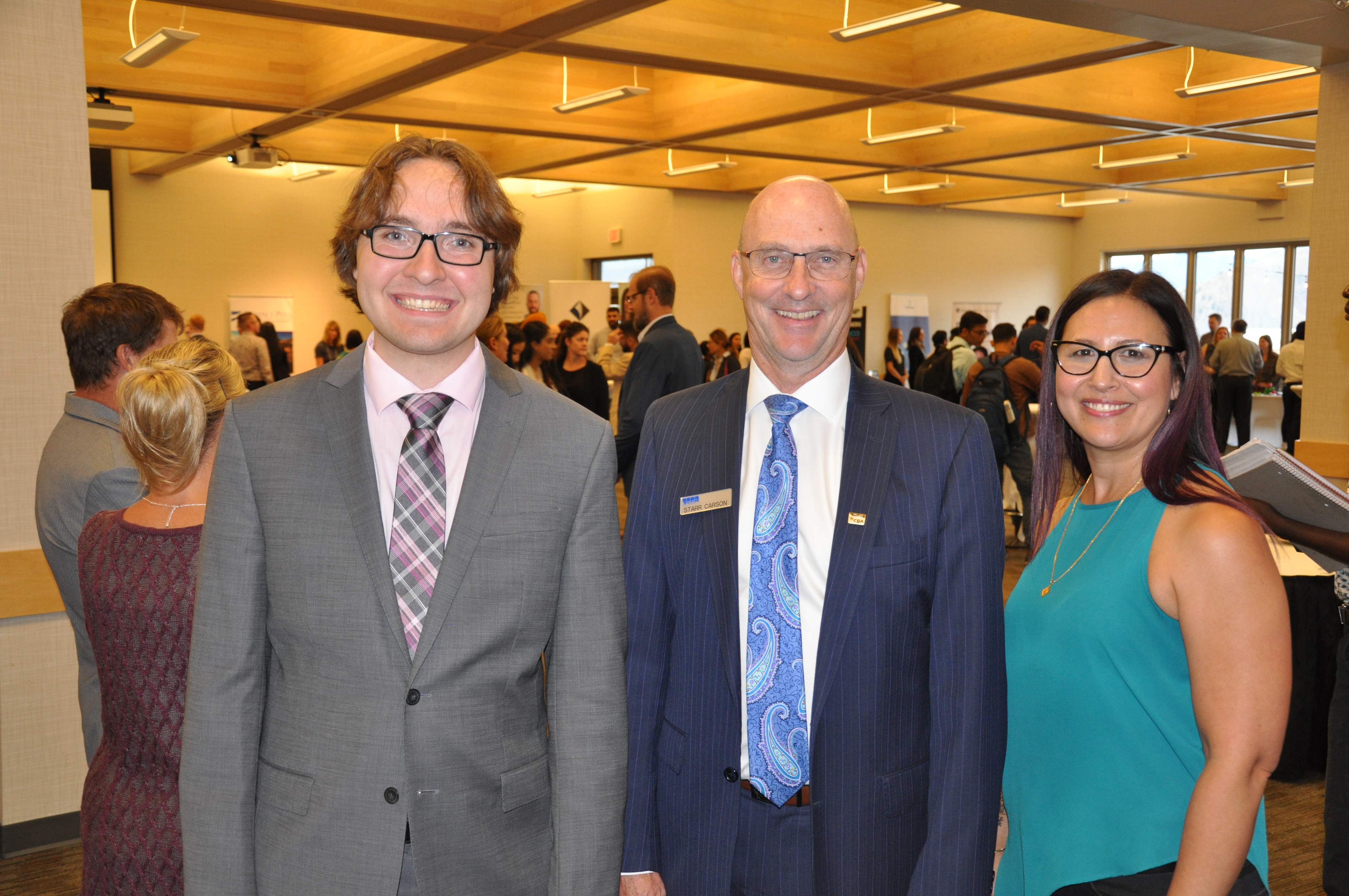Jennifer Mei

@JennMei
About

Jennifer Mei
@JennMeiPosts
A Clinical/Practicum Accessibility Guide: Tips for Faculty
Introduction
This guide is intended to support faculty members and supervisors with improving accessibility practical learning settings. It provides general information about how faculty can support students with disabilities in meeting the essential practical requirements of their program. The context of this guide assumes that most Canadian post-secondary institutions have similar service provision infrastructures in place, such as an accessibility office.
Definitions
Field Placements
Field placements, also known as practicums and/or clinicals are a mandatory, academic experiential learning component of a degree program. The placement is approved by the governing faculty (i.e. School of Nursing, Faculty of Social Work). The student is usually required to work under a licensed professional and can receive either a passing or failing grade.
Disability
AccessTracks uses the terms medical condition, injury and disability to describe a diagnosable condition that impacts permanently or temporarily impacts a person’s functioning. The World Health Organization uses the overarching term “disability” to describe most of these conditions. Here are just some examples of medical conditions that are considered a disability in Canada. See Appendix 1 for a list of conditions the Canadian Government defines as a disability.
Accommodations
Accommodations are tools, interventions, assistive technology, and equipment that reduce barriers/functional impacts for people with disabilities so that they can meet the expectation of the job. In some cases, a student may not identify as having a disability, but they may have an on-going medical condition that would make them eligible for accommodations.
Functional Impacts
A functional impact describes how a person’s medical condition or disability affects the way they work and learn. For example, a person may have difficulty interacting socially or experience on-going migraines (See Table 1). A person’s medical diagnosis is considered confidential; therefore, employers should accommodate based on how a person’s functioning is impacted, rather than on their diagnosis.
Table 1 – Example Functional Impacts and Accommodations
| Functional Impacts | Adaptations |
| Sitting | Stretch breaks |
| Standing | Stool/chair for rest |
| Stair Climbing | Accessible Workspace |
| Communication | Assistant / Interpreter |
| Fatigue | Stretch breaks/extra time |
| Attention / Concenration | Distraction reduced environment |
| Social interactions | Redistribution of workload / accessible space |
| Information Processing | Extra time, repeat instructions |
| Memory | Project management software |
| Time Management | Time management software |
Accessibility Office
Most institutions have an accessibility office that students can register with to request academic accommodations. Accessibility professionals within this office can often support faculty supervisors in determining reasonable accommodations for field practicums.
Accommodation Letter
If a student is registered with their accessibility services office, their accessibility professional may send a letter to a faculty member outlining approved field placement accommodations.
Essential Requirements
Essential requirements are learning milestones that a student must meet to receive a passing grade in their courses. These requirements can also be described as learning outcomes in the course syllabus. Field placements allow students to demonstrate that they have learned a specific set of practical skills that help qualify them for future employment.
Accommodations
Starting Out the Semester
Here are some tips to prepare for students who need may require clinical/practicum accommodations.
- At the beginning of the semester, remind students who may need accommodations for a practical or clinical placement to meet with an professional in your accessibility office to discuss their needs, even if the student is not sure what they need yet.
- Accommodations can take time to implement, so the earlier the student can notify the accessibility office that there is a practical component to their program, the better. It is recommended that faculty supervisors still try to accommodate students who have disclosed a disability or ongoing health condition even the student does not want to access services through the accessibility office.
- Including information about accessibility in your syllabus is a good way to start the conversation about accommodations early.
Receiving an Accommodation Letter
If you receive an accommodation letter for a student:
- Set aside some time to speak with the student privately about how to best support them in the field/practical setting (unless otherwise specified in their accommodation letter).
- If you are still unsure of how to implement the recommended accommodations, try contacting your accessibility office for assistance. Accommodations are usually based on medical documentation provided by a certified healthcare professional.
Maintaining Confidentiality
Medical information is considered personal and confidential.
- If a student has not disclosed to you, avoid asking if they have a health condition or disability. The most effective way to approach this situation is to build trust, offer support and allow the student to disclose information as they are comfortable.
- If a student discloses and/or you receive an accommodation letter for a student, refrain from disclosing this information to other students or faculty members in your department. Set a side to speak to the student about their accommodations privately and contact your accessibility office if you require support.
Disclosure
If you think a student may be struggling in their clinical/practicum placement due to a disability or health condition:
- Set aside some time to speak privately with the student to discuss their academic progress in their field placement.
- Avoid attributing the student’s struggles to a disability or medical condition. Instead, ask if they are accessing any student services to help support them with their learning this semester.
- Refer the student to your institution’s general student services desk to triage services (if any) that best support them.
Disruptive Behaviour
Issues with behaviour can be a functional impact related to a disability, therefore, efforts must be made to accommodate the student.
- If a student exhibits disruptive behavior, set aside some time to speak privately with the student about your concerns to see if the issue can be resolved.
- If the disruptive behaviour continues and the student is registered your accessibility office, encourage the student to connect with their accessibility professional to review accommodations. If the student is eligible, there are a number of accommodations that may minimize problems with behaviour.
- If the behaviour becomes a safety concern, you may need to connect with your faculty leadership to discuss your institution’s safety protocols.
Essential Requirements
Assessing essential requirements
If you believe an accommodation may compromise an academic requirement of your degree program,
here are some options to consider:
- Contact your institution’s accessibility office for assistance with determining whether the student would be otherwise qualified to participate in a field placement if reasonably accommodated.
- Consult your chair, dean, other post-secondary institutions and/or other related resources for possible accommodation solutions.
- Review your clinical/practicum standards and requirements to ensure that they are in line with minimum learning/performance qualifications.
- Make sure students have been clearly informed of all behavioral and clinical performance standards.
- Work with your field/practicum host to come up with possible accommodation solutions Oakley, B., Wideman, M., & Parsons, J., 2012).
Impacts vs. Learning Outcomes
There is a difference between functional impacts related to a disability and a non-ability to meet learning outcomes (See Table 2). For example, a nursing student with a hearing impairment may be required to demonstrate an ability to build rapport with patients. In this scenario, building rapport is the learning outcome and hearing is the functional impact. This functional impact could be accommodated using technology such as an FM system and safety concerns could be mitigated by developing protocols that will help keep both the student and the patient safe.
Table 2– Examples Functional Impacts vs. Learning Outcomes
| Functional Impacts | Learning Outcome | Concern | Accommodation |
| Hearing Impairment | Build rapport | Difficulty hearing patient | FM Pen; Safety training |
| Fatigue | Administer meds on schedule | 12-hour shift | Split shifts; different learning environment |
| Memory | Write case notes | Incomplete, inaccurate charting/notes | Notetaking, recording, confidentiality plan |
According to Pardo & Tomlison (1999), “The duty to accommodate…includes a willingness to be creative and directed in the search for accommodating students; that more than an negligible effort is require in devising an academic accommodations; and that is the accommodation must be meaningful to the student’s individual needs”. (p. 15).
Denying An Accommodation Request
Students with disabilities must be able to perform the essential tasks of his/her profession in a competent manner with reasonable accommodations in order to be eligible for a field placement (Pardo & Tomlinson, pg. 49, 1999)
If you choose to deny an accommodation, here are some ways to prepare for this decision:
- Be prepared to illustrate that the requirement is an essential part of the degree program. (pg. 50)
- Explain how accommodating a student with a disability would lower the academic requirements
- If applicable, explain how the accommodation “would create a significant risk of substantial harm to the health or safety of others [direct threat] and no reasonable accommodation is available that would allow the student to perform the essential requirements/and or functions without creating such a risk” (Sorley, 1994, P. 531).
- Be confident that you have thoroughly investigated all possible accommodations and/or removal of environmental barriers and include the student in the program of study in the discussion.
Creating A Policy
If your specific faculty does not have an accessibility policy related to your field for accommodating students, here are some tips for developing one:
- Before creating a policy custom to your faculty for accommodating students with disabilities, make sure to consult legal counsel.
- If a student is at risk of termination or discipline in your program, make sure the student is advised as such prior to dismissal or disciplinary action.
- The policy should indicate to what degree the student can rely on the assistance of another (i.e. educational assistant) in making clinical assessments and decisions. For more support see Identifying Essential Requirements: A Guide for University Disability Service Professionals.
- Encourage students who have disclosed that they have a disability to use the resources available through the accessibility office.
- Students who have been terminated from the program or have received disciplinary action have a right to challenge the decision through an appeal process.
References
2017 Canadian Survey on Disability (2018, November 28). Retrieved August 6, 2019, from https://www150.statcan.gc.ca/n1/pub/11-627-m/11-627-m2018035-eng.htm
BC Public Service Agency. (2019, June 04). WorkSafeBC Coverage & Claims. Retrieved August 2, 2019, from https://www2.gov.bc.ca/gov/content/careers-myhr/all-employees/safety-health-well- being/workplace/worksafebc/coverage-claims
Oakley, B., Wideman, M., & Parsons, J. (2012, June 13). Identifying Essential Requirements: A guide for university disability service professionals. Retrieved from https://www.academia.edu
Pardo, P., & Tomlinson, D. (1999). Implementing academic accommodation in practicum/field settings. University of Calgary Publications. Retrieved from http://contentdm.ucalgary.ca/digital/collection/ucpub/id/49826/
Sorlie, D. E. (1994). The Americans with disabilities act: Implications and suggestions for compliance for medical schools. Academic Medicine, 69(7), 525–535.
20
Presentation Overview
This presentation is intended for career practitioners who would like to know more about how they can better support students with disabilities in transitioning to the workplace. During this presentation, we will discuss what defines a disability, functional impacts, reasonable accommodations, duty to accommodate, as well as roles and responsibilities of career practitioners when supporting students with disabilities. We will also cover practice and communication approaches to supporting this student population from an equity, diversity and inclusion perspective. Suggestions and recommendations for practical tools and resources to support career practitioners will be provided at the end of the presentation.
Speaker Biography
Jennifer Mei is a Registered Social Worker and Masters of Social Work student with over a decade of experience working with people with disabilities. The majority of her experience has been as a career practitioner in the context of vocational rehabilitation and employment counselling. Jennifer is passionate and committed to equity, diversity and inclusion work. Her approach to this work comes from a desire to learn from and empower marginalized populations.
Breaking Down Barriers: A Story of Courage, Determination and Success

Pictured left to right: Dylan Salviati, TRU Co-op student, Starr Carson, Partner, KPMG and Jennifer Mei, Accessibility Career and Experiential Learning Coordinator.
Written by Jennifer Mei, Accessibility Experiential Learning Coordinator, in collaboration with Dylan Salviati October 1, 2019
Thompson Rivers University co-op student, Dylan Salviati, recently accepted a full-time position as a junior accountant with prestigious accounting firm, KPMG. For Dylan, getting to this point in his life was not an easy ride. When Dylan was young, he was diagnosed with autism and told by the assessor that he would never read or attend post-secondary education. Disappointed by this news, Dylan believed that a future that included a university degree was impossible. While still in elementary school, Dylan participated in a research program that involved the use of singing to help children with autism learn how to read. Through this program, Dylan learned to read and went on to attend high school. In high school, Dylan approached his academics with a positive attitude and discovered he was excellent with numbers. Through his openness and willingness to help others, Dylan gained the respect and friendship of his peers. As you already know, Dylan went on to attend post-secondary and is now a successful co-op student with a promising future as an accountant. But, that’s not the whole story.
As a co-op student at KPMG, Dylan had an important decision to make: whether or not he should disclose to the employer that he has a disability. While he believes that attitudes about disability have come a long way, he was still worried about discrimination. Dylan says, “Invisible disabilities are the most difficult to talk about because a first impression from an employer might be that I look normal but once they have a chance to interact with me they realize there's something different.” He also explains that, “Everyone is different and while there are similarities, each person’s experience with autism is unique.”
Dylan wanted to be able to speak openly about his disability because he believes that describing how he works best is an important aspect of working with employers who might not understand how a person’s disability impacts them. Dylan’s disclosure was received by the employer as an opportunity to learn and understand how to best accommodate his work style. Throughout his work-term, Dylan was able to demonstrate his strengths through commitment, hard work, and his belief that for him to be successful he must be open and genuine.
Dylan’s courage opened up opportunities for learning and created a safer space for conversations about how disability touches people’s lives. He hopes that sharing his experiences will bring awareness to the impacts of stigma and discrimination and empower other people with disabilities to pursue their own versions of success. For Dylan, he is profoundly grateful for the people who supported him along the way and attributes much of his success to those who believed in him.
“It’s people that change the lives of other people.” – Dylan Salviati
Looking for an inclusive employer? Ask these 9 Questions During your Interview

Job Searchers! If you’re looking for some creative questions to ask post interview and you want to know if the employer is a good fit for you, take a look at this article by Anne Shaw published on themuse. These tips are a great way to find out whether an employer is open to accessibility without disclosing any disability related information.
To access this article, click here: Daily Muse Inc.
Tips for Employees How to start a mental health conversation with a colleague

Your colleague hasn’t been themselves lately. They seem short tempered, erratic and withdrawn but you are not sure how to approach them about your concerns. If this is a situation you have experienced, check out this article by Camille Howatt and Camille Quenneville on how to start a mental health conversation with a colleague.
As a caring friend and co-worker, it’s ok to wonder how you can help. Creating awareness about mental wellness in the workplace is an important step in reducing stigma. And starting the conversation may just provide an opportunity for your colleague to get the support they need. To access this article, click here: The Globe and Mail
British Columbia to Act on Accessibility for Disability

“Approximately 15 per cent of British Columbians over 15 years old self-identify as having a disability. Our goal is to prevent and remove barriers so everyone can participate and feel included. This way, B.C. will be a better place to live, work and visit for everyone.” (Province of British Columbia, 2018)
According to the Province of BC website, we have committed ourselves to become a truly inclusive province by 2024 by implementing the following strategies:
- providing people of all abilities with the opportunity to fully participate in their communities
- challenging our attitudes and beliefs about disabilities
- recognizing the value and contributions that people with disabilities make to our workplaces, communities and economy
While these action items may support a stride towards an inclusive province over the next 6 years, I would ask, how will the Province of BC be held accountable to its commitments? What should people with disabilities do if these values of inclusivity are not upheld? I can say with confidence that, despite the good intentions of the Province, individuals with disabilities are often rendered voiceless in instances of discrimination. I would suggest that this is largely due to the arduous process involved in escalating a complaint to the BC Human Rights Tribunal.
The Province of Ontario has established an Accessibility for Ontarians with Disabilities Act. This Act provides Ontarians provides citizens living with disabilities with the option to pursue legal action against their discriminators other than going through a Tribunal process.
I am hopeful that the British Columbia Accessibility Act drafted in May 2018 will give British Columbians the same option. It is difficult to comment on the current content of this Act given that there has been very little progress made. However, I anticipate that its intention is to offer an additional avenue of recourse to citizens living with disabilities who have experienced discrimination. Such an Act may also provide the citizens of BC a measure of autonomy in their pursuit for equity and an opportunity to address their complaint via litigation. Hopefully, this would alleviate the pressure related to the victim’s responsibility to prove and present their case to Tribunal decision makers and make way for case law to preside based on individual circumstances.
The Province acknowledges that there is a significant number of British Columbians living with disabilities and that we should be working towards being a truly inclusive province. Therefore, I hope we continue to find ways support equity and diversity and hold those who do not align with this goal accountable.
Additional Information:
https://accessontario.com/british-columbia-accessibility-act/
Canadian Law Faculty Extra-time debate

Canadian Law Faculty members debate over the provision of extra-time on exams for mental health-related disabilities.
The debate related to students with disabilities being granted extra time for exams continues in this November 2017 University Affairs article by Andre Costopoulos.
In his 2016 article published in the Education and Law Journal, Bruce Pardy, a law professor at Queens University, argues that “extra-time accommodations are not legitimate and should not be granted because they tilt the playing field against the best students.”
In response to this argument, Renu Mandhane, Ontario Human Rights chief commissioner, conveys a poignant response in an article published by the Huffington Post. In short, she asserts that “The hard truth is, not all subjectively desired qualifications are objectively essential. Just because a professor might prefer a student who does not require additional time on an exam, does not make the absence of mental disability an essential qualification. Instead, a careful, good-faith inquiry into the truly necessary qualifications must be undertaken to support the needs of our students.”
Likewise, in response to Pardy’s article, York University’s Benjamin Berger, Associate Dean and Lorne Sossin, Dean of Osgoode Hall Law School, respectively, point to the importance of universal design in a National Post article published in August 2017. “This is the idea that barriers are not in the individual but rather in the environment, and that appropriately designed environments remove barriers that are unnecessary.”
